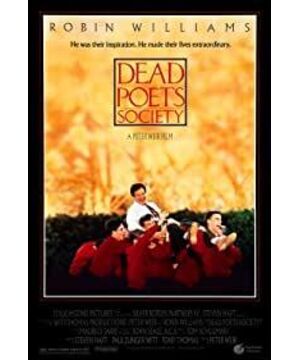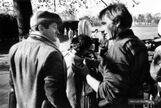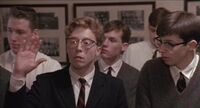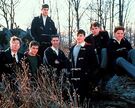In this film, there are many impressive characters: John Keating, who teaches in a different and vivid way, Neil Perry, who dares to pursue his dreams, Charlie Dalton, known for his hilarious humor, and Knox Overstreet, handsome and daring to pursue love. However, there is one other person who stands out to me, and that is the unremarkable Todd Anderson. He is introverted and not good at talking, but he also has a heart that is eager to grow. In this review we will tell the story of Todd Anderson.
At the beginning of the new semester, Todd Anderson came to Wilton Preparatory Academy to study, which is an excellent school with a dignified school spirit and traditional education.
When his mother introduced him to the principal, the principal said, "You have a great future, young man. Your brother is one of our best students." When his roommate greeted him on campus and asked him why he had transferred, he said, "My brother used to go to school here." When his roommate introduced him to other classmates and said his brother was Jeffrey Anderson, some of the classmates showed surprise and admiration, saying, "That's the valedictorian, the national outstanding student."
Because of his brother's excellence and fame, Todd has lived under the shroud of his brother's halo since he was a child, and has become very introverted.
After coming to this school, two people have brought him a profound influence, one is his roommate Neil, and the other is the literature teacher Keating.
Neil
When Todd first met Neil, Neil eagerly invited him to join the study group; when Neil asked him again, he declined, saying that he would study history in the dorm at night.
Also introverted, I actually understand Todd's euphemistic rejection. I don't feel comfortable and at ease in a study group environment with several people, so instead of joining a study group, it is better to study alone in a dorm.
However, rejecting his friend's kindness also lost the chance to become friends with him. Fortunately, Neil is not such a person.
Under the influence of Mr. Keating's thoughts, Neil wanted to re-establish the Dead Poets Society and asked Todd if he wanted to join. Todd said, "I want to join, but I don't miss poetry." Then, Neil said, "Do you really have a problem with poetry?" "I don't, I just don't miss it," Todd said.
Todd's awkward thinking is really incomprehensible to ordinary people, but I can understand his feelings. He cares a lot about whether his behavior is weird and funny in the eyes of others, but in fact, no one pays special attention to his behavior at all. It's like when I was running gymnastics in high school, I was always worried that it would be bad if I shouted slogans too loudly, so before anyone else said it, I would automatically shout in a lower voice.
With an idea, Neil suggested to Todd, "What if you don't have to read poetry? What if you only have to listen?" For this reason, Neil asked a few other students for their opinions. As a result, neither of them minded whether Todd read poetry or not. In this way, Todd joined the Dead Poets Society, and sang in the cave with Neil and other classmates, experiencing this kind of adventure.
In a chat, Neil was so annoyed at Todd that being a member of the Dead Poets Society didn't do anything, so he told Todd, "Being a member of the Dead Poets Society means you Be passionate, but you look like a stagnant pool," adding, "Getting involved means doing something, not just talking about it."
At this time, Anderson expressed his true thoughts: he felt that he was different from Neil. Neil was listening to what he said, but no one paid attention to what he said. He also told Neil to leave him alone, he could take care of himself. But Neil just said "no" and took the poem he wrote, and then the two of them started fighting in the dormitory, as if it was nothing to be annoyed with each other just now.
Anderson is lucky to have such a caring friend by his side.
Later, one time on Anderson's birthday, his parents sent a birthday present, and he took the gift and went to the school terrace in a daze. He was very sad because his parents gave him the same stationery box as last year's birthday present. He couldn't feel the concern of his parents at all. He couldn't figure it out, what parent in the world would give their child the exact same stationery box as a birthday present for two years in a row?
At this time, Neil passed by and accidentally saw the depressed Anderson, so he walked over, only to find out it was because of this when he asked. Then, Neil began to enlighten Anderson, and he enlightened in a very special way.
Neil said that the stationery box looks very streamlined and doesn't know how it will fly out, but he's sure it will be the world's first unmanned stationery box. Then, he picked up the stationery box and handed it to Anderson, who threw the stationery box from the high terrace with all his strength. Watching the various things in the stationery box fall in the air, the sullenness in Anderson's heart was also swept away.
I think it was also at this time that Neil really entered Anderson's heart and became his identified friend. Because in his lonely moments, Neil saw him and enlightened him. For a child like him who is not seen or valued at home, all he needs is to be seen, which can make him feel that he is important, not a transparent existence.
Mr. Keating
After Mr. Keating's first class, "Listening to Death," Anderson would write "seize the day" in his notebook. When other students were worried about whether the content of Mr. Keating's lectures would be tested, he took Mr. Keating's words to heart.
After Mr. Keating left homework to write a poem, he would seriously write his poem in the dormitory, and even read it seriously before class the next day. But in class the next day, when Mr. Keating asked him to read his poems on the podium, he said, "I didn't write poems."
As an introvert like Anderson, I really understand the situation, because I have done the same thing.
I remember in high school math class, the teacher asked me to think about a problem. I suddenly turned my eyes and came up with the answer to the question. Unexpectedly, this scene was captured by the math teacher. She called me up to answer the question, but I spookedly said "I don't know" or "I haven't figured it out yet," and the math teacher sat me down.
Fortunately, Mr. Keating in this movie did not give up. He seemed to see through Anderson's thoughts and said, "Anderson thinks that his inner thoughts are worthless and make people laugh, but I think you are wrong, I think there is something in your heart that is very valuable." After that, He quotes Whitman — "I stand on the roof of the world shouting my wild roar" — to encourage Anderson to shout "wildness" in himself.
Then, Anderson wrote a great poem in the classroom under the "force" of Mr. Keating.
A lunatic with sweaty teeth stared at my heart pounding He stretched out his hand and pinched my neck He kept talking about the truth The truth is like a blanket that keeps your feet cold all the time, no matter how much you pull or pull, it's never enough to kick Well, fight or fight, it can't cover us from the time we were born crying until we were dying, it just covers your face, no matter how hard you cry or howl
As soon as he finished writing the poem, he won applause from his classmates, and Mr. Keating encouraged him to remember how he felt at the moment. Presumably Anderson will never forget the growth he experienced at this moment.
finally
In the film's follow-up episodes, Neil couldn't stand his father taking his chance to pursue his dreams, and ended up taking his own life. After hearing the news, Anderson was heartbroken because his best friend had left...
A student committed suicide, and the school must find the culprit. And that scapegoat is undoubtedly the teacher Keating who influenced them to bravely pursue their dreams, pursue love, and explore themselves.
The former friend is also uncharacteristically, blaming Mr. Keating's indoctrination for Neil's death. At this time, Anderson no longer kept silent as before, but retorted loudly, shouting to the classmate, "It's not like that, you know, Mr. Keating didn't teach us anything, it's Neil who likes acting." . Moreover, Anderson knew in his heart that Neil could not have done this because of Neil's father.
In the end, several classmates such as Anderson and Overstreet, under the pressure of the school and their parents, had to sign the document, identifying Mr. Keating as the culprit that led to Neil's suicide.
During the last literature class, Mr. Keating came to the classroom to retrieve his own things. At this time, Anderson bravely stood up and said to Mr. Keating, "They forced us to sign, please believe me." Teacher Keating said, "I believe in you, Todd."
When Mr. Keating walked to the door and was about to leave the classroom, Anderson finally gathered up the courage to stand on the desk again and shouted "O Captain, My Captain". At this time, the boy who used to be the most cowardly in the class was the first to stand up and became the bravest boy.
After a while, other students also stood on the desk one after another, remembering Mr. Keating's teachings in the way that Mr. Keating had taught them. And Teacher Keating was tearful and said, "Thank you, kids."
The movie ends here. But I think that even if Neil dies and Mr. Keating is gone, Anderson will definitely remember these two people who influenced his growth, because they have always lived in his heart and never left.
View more about Dead Poets Society reviews






